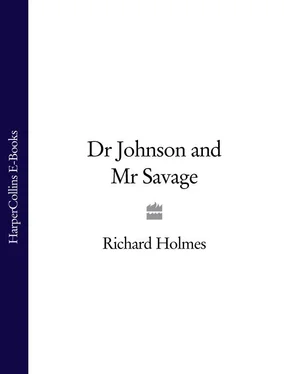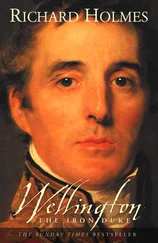… His life was Want, yet could his duteous Verse
The Cruel’s praise, that help withheld, rehearse.
Danger extreme * , th’unhappy lawless knew,
And woes he felt, as woes were all his due.
Twice sov’reign Mercy found, a Queen * to save,
From pitying Heaven, to end his cares, a grave. 4
It is remarkable that the Epitaphist assumes that all his readers will be familiar with the circumstances of Savage’s trial, more than fifteen years before, and merely puts asterisks against the references to it, with a knowing footnote. His cause is still alive, even if the ‘unhappy’ poet himself is dead. Injustice, as much as poetry, has already granted him a kind of immortality.
Even though published in the Gentleman’s Magazine , a largely pro-Savage paper, the Epitaph is by no means a panegyric. It accepts that Savage is a controversial figure, that the woes he felt were all his ‘due’, that he brought trouble on himself, that he was ‘lawless’ and that his ‘cares’ drove him to a premature grave. Nevertheless he remains a man of genius, a poet hounded by ‘the Cruel’ woman and suffering some ill-defined persecution and social injustice. Savage is not merely a case; he is already a cause.
The second document is an open letter to Edward Cave, the editor of the Gentleman’s Magazine under his pseudonym Mr Urban, announcing a forthcoming biography of Savage. It appeared within three weeks of Savage’s death in Bristol, and immediately demonstrates how topical the cause was. As the announcement explains, the anonymous writer will defend Savage’s memory, and use his personal knowledge of the subject to produce an intimate portrait. It will be the work of a friend and confidante.
Mr Urban: As your Collections show how often you have owed the Ornaments of your poetical Pages, to the Correspondence of the unfortunate and ingenious Mr Savage, I doubt not but you have so much regard to his Memory as to encourage any designs that may have a tendency to the Preservation of it from Insults or Calumnies, and therefore with some Degree of Assurance intreat you to inform the Publick, that his Life will speedily be published by a Person who was favoured with his Confidence, and received from himself an Account of most of the Transactions which he proposes to mention to the Time of his Retirement to Swansea in Wales. 5
The letter adds that the Life will also give details of his imprisonment in Bristol, and use extracts from Savage’s own private letters and those of his friends: ‘materials still less liable to Objection’.
Great emphasis is laid on the speed at which this Life will be produced, and the accuracy of its sources. Other potential biographers are warned off the subject. The readers must also beware of any rival, romanticised versions which rely on speculation or fiction.
It may be reasonably imagined that others may have the same Design, but as it is not credible that they can obtain the same Materials, it must be expected they will supply from Invention the want of Intelligence, and that under the Title of the Life of Savage they will publish only a Novel filled with romantick Adventures, and imaginary Amours. You may therefore perhaps gratify the Lovers of Truth and Wit by giving me leave to inform them in your Magazine, that my Account will be published in 8vo by Mr Roberts in Warwick-Lane. 6
This book is to be a true biography, quite different from the kind of ‘novelized’ lives which had become popular through the work of Daniel Defoe or Eliza Haywood, with their obsession with scandalous adventures and sexual exploits. The biography will be committed to an ideal of human truth, moral truth. It will be based on a distinction between fact and fiction. In short, the letter makes both a commercial claim to the literary market in Savage, and an aesthetic claim about the form of true biography. It adds, in a forthright manner, where the Life can be bought; though not yet the price.
This letter is written by the young Samuel Johnson, and is of historic importance in the development of English biography. It confidently asserts the value of the biographic form to a general public, the ‘Lovers of Truth and Wit’; and aggressively declares war on the titillating fictional art of the Novel.
Samuel Johnson’s publisher, Mr James Roberts of Warwick Lane off the Strand, saw the Savage story in different terms. As a publisher, Roberts specialised in tales of social scandal, runaway heiresses, adulterous skirmishes among the aristocracy, lost fortunes, orphaned sons, and careers of glittering crime. The Savage saga was easily adapted to this formula, and Roberts accordingly placed a long advertisement in the London Evening Post pointing out that the biography – though literary in appearance – could be safely relied on for its sensational contents. In this third document, Savage’s life is seen as a labyrinth of deceit, injustice, passion and wrongdoing: in short, everything that might be expected of a poet’s unstable existence in a materialistic society, redeemed only by the gracious interventions of royalty.
An account of the life of Mr Richard Savage, son of the late Earl Rivers. Who was, soon after he came into the world, bastardised by an act of Parliament, and deprived of the title and estate to which he was born; was committed by his mother, the Countess of Macclesfield, to a poor woman, to be bred up as her own son; came to the knowledge of his real mother, now alive, but abandoned by her, persecuted, and condemned for murder, and against all her endeavours, pardoned; made poet laureate to Queen Caroline, became very eminent for his writings, of which many are quoted in this Work, particularly the ‘Bastard’, the ‘Wanderer’, ‘Volunteer Laureate’, and ‘Author to be Let’; went into Wales, to be supported by a subscription, promoted by Mr Pope, but at last died in Prison. 7
This racy summary, with its neat and misleading telescoping of facts, conforms to the shape of what we might call an urban fairy tale. Savage is a kind of Frog Prince, placed under a cruel spell by his Wicked Mother, and saved from the jaws of death by the Good Queen, who transforms him back into his true self as an eminent poet. The premature death in prison, somehow under the auspices of Mr Pope (the most financially successful poet of the age), becomes a kind of moral to this tale. The poor Poet, whether saved or not, will always suffer for his Art. This is not so remote from the story actually told by Johnson; but it indicates what the public wanted to hear about Savage. His life will be an awful – and delicious – warning; and incidentally a very good read.
These are the reactions which people had to Richard Savage at the time of his death in 1743. They are already complicated and various. Savage had caught the popular imagination in a remarkable way. But most remarkable was the biographer who immediately entered the lists on his behalf. Who was this man?
Here again we are confronted with something peculiar in the nature of biography, and its layerings through time. If we assume that it was Dr Samuel Johnson (who received his doctorate from Trinity College, Dublin, in 1765), the man who subsequently made a household name in English literature through the work of James Boswell, we will understand little of the story that now begins to emerge. We have to deconstruct almost entirely that powerful, domineering, confident, late-eighteenth-century figure whom Boswell created in his own biography. We have to recover a much more shadowy, fraught and uncertain personality: young Sam Johnson, failed schoolmaster, provincial poet, and desperate Grub Street hack, who signed his letters in 1738 ‘ impransus ’ – supperless.
It is worth considering here another fiction. What might an imaginary obituarist also have made of Johnson at this period? Suppose Samuel Johnson had also died at about forty years old, say in the summer of 1749 when he had been in London for just over ten years? This is Johnson more than a decade before he met Boswell. This is Johnson still virtually unknown, beyond a small circle of Fleet Street booksellers, when he has just published his first signed work, The Vanity of Human Wishes. This is the young Samuel Johnson that Savage would have recognised, but that we, looking backwards through history and Boswell’s biography, might find difficult to imagine at all. This is how Death might have briefly framed his portrait at that date:
Читать дальше












